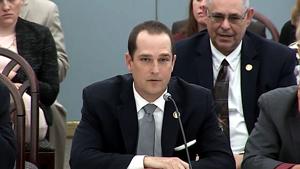Pennsylvania House committee, on party line vote, advances Taxpayer Protection Act

(The Center Square) – A longtime priority of fiscal conservatives in Pennsylvania is once again up for consideration in the state House of Representatives.
The Taxpayer Protection Act is a constitutional amendment sponsored by state Rep. Ryan Warner, R-Perryopolis. It seeks to cap the amount that the state’s budget can increase each year based on the rate of inflation and population growth.
A Senate version will be introduced by Sen. Camera Bartolotta, R-Carroll Township.
If the legislation is passed by two consecutive sessions of the Legislature and then approved by voters, it would create a significant speed bump for state budgets that have grown at a rate that exceeds inflation for years.
The legislation does provide that if a two-thirds supermajority of both the House and Senate votes to do so, it would still be possible to grow the budget at a rate that exceeds the bill’s restrictions.
On Wednesday, Warner’s bill was considered by the House State Government Committee and was advanced to the full House on a party-line vote, with all 15 Republicans in favor and all 10 Democrats opposed.
A longtime and enthusiastic supporter of the legislation is the Commonwealth Foundation, an advocacy organization that supports limited government and free-market policies. In a news release, the foundation hailed the committee’s decision to advance the bill.
“We are glad to see the House State Government Committee act so swiftly to prioritize the fiscal health of the commonwealth at a time when responsible financial habits are needed more than ever,” said Nathan Benefield, the foundation’s vice president and chief operating officer. “The Taxpayer Protection Act promises an end to the state government’s common practice of spending far beyond what Pennsylvanians can afford. Enacting this bill will protect families and businesses from dangerous tax hikes as they try to recover from the economic pain caused by the COVID-19 economic downturn.”
Opponents of such legislation have argued that it ties the hands of future lawmakers, potentially creating situations where needed solutions can’t be enacted because the vote threshold for going beyond the annual spending cap is so high.
State Rep. Jared Solomon, D-Philadelphia, argued during Wednesday’s hearing that it was unnecessary for the state Constitution to constrain lawmakers’ procedures to such a degree.
“This doesn’t really read like a constitutional amendment,” Solomon said. “It kind of reads like an operating manual. And I don’t think that’s a good idea that we put operating procedures that really attempt to regulate prudence, which, by the way, I don’t think you can do, into our Constitution.”
Bartolotta, in her sponsorship memo, argued that the majority of states have such measures on the books.
“According to the National Conference of State Legislatures, thirty states operate under a tax or expenditure limitation,” she wrote. “Pennsylvania is in the minority of states having no controls.”
Disclaimer: This content is distributed by The Center Square

